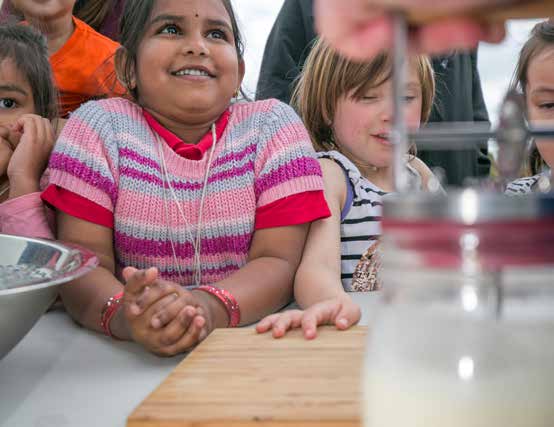Quality and valued nutrition
We will produce the highest quality and most valued dairy nutrition
This Commitment is to all the consumers of our dairy products, whether in New Zealand or in the more than 140 countries we export to. Milk and milk products are one of the most complete and nutrient rich sources of protein for the lowest calories, making them a perfect building block for a healthy diet for young and old. We want to make sure our consumers can continue to choose dairy nutrition from New Zealand and that we protect what they value about our milk, maintaining the high standards of safety and integrity that have made New Zealand milk and dairy products beloved and trusted around the world.
Goal
- The New Zealand dairy story is maintained and utilised.
Other areas of focus
-
- Maintaining zero compromise on the food safety and integrity of New Zealand dairy products, through the effective operation of the food safety and biosecurity frameworks that underpin dairy trade.
- Ensuring consumers have the choice of New Zealand dairy nutrition by maintaining and growing New Zealand exporters’ access to open dairy markets.
- Ensuring the unique value proposition of New Zealand milk is understood by our stakeholders.
Nutrition and health
Milk and dairy products are nutrient-dense and provide high quality protein and micronutrients in an easily absorbed form and for a relatively low caloric content (especially calcium). In the context of a well-balanced diet, adequate milk consumption at various stages of life has benefits for health and in the prevention/control of various non-communicable diseases.
Dairy is one of the most affordable sources globally of a variety of essential nutrients, and has been recognised as part of low environmental impact diets consistent with good health. New Zealand dairy provides high quality nutrients for a low carbon footprint. A report in 2022 outlined New Zealand’s high-quality dairy is among the most emissions-efficient in the world.
Global Trade in dairy products
More than 90% of New Zealand’s dairy production is exported, to more than 130 countries around the world. There are still many barriers to trade in dairy products, with typically high tariffs applied to dairy and onerous technical requirements (known as ‘non-tariff barriers’). The impact of non-tariff measures is significant – New Zealand dairy exports are estimated to incur $5.6 billion in non-tariff barrier costs annually.
A number of countries also use subsidies that distort production and trade.
Free Trade Agreements, and the global rules established under the WTO, provide important certainty for exporters and can open up new market access opportunities. More information about New Zealand’s FTAs and dairy’s market access challenges can be found on the DCANZ website.
Non-tariff barriers also create uncertainty, inhibit investment, increase the risks of entering new markets and have a greater impact on SMEs.
Food security
Food security was defined by the World Food Summit in 1996 as existing “when all people, at all times, have physical and economic access to sufficient, safe and nutritious food that meets their dietary needs and food preferences for an active and healthy life”.
According to the FAO “Considering all people in the world affected by moderate levels of food insecurity together with those who suffer from hunger, it is estimated that over 2 billion people do not have regular access to safe, nutritious and sufficient food”.
Governments have pursued many different policies to support food security, ranging from trying to improve agricultural productivity and promote sustainable agricultural practices, through to actively subsidising food production, controlling food exports and driving for food self-sufficiency. However many countries do not have sufficient land, water, climate or other resources necessary to meet all their food needs and rely on imports to supplement local production.
This trade makes a critical contribution to global food and nutritional security by allowing food to flow from areas of surplus to areas of deficit, as well as improving the efficiency and profitability of domestic food producers to supply domestic markets with high quality, affordable and sustainably produced food. It has also been an enabler of global value chains for food products that have supported producers to access inputs and reduce costs in order to provide more diverse and affordable food choices to consumers.

